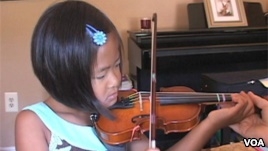(单词翻译:单击)
听力文本
From VOA Learning English, this is the Education Report.
Many people believe that teaching children music makes them smarter, better able to learn new things. But the organizers of a new study say there's no scientific evidence that early musical training affects the intelligence of young people.
An estimated 80 percent of American adults think music lessons improve children's ability to learn or their performance in school. They say that the satisfaction for learning to play a new song helps a child express creativity.

Children Learn to Play Music by Listening
Researchers at Harvard University, however, have found that there's one thing musical training does not do. They say it does not make children more intelligent.
Samuel Mehr is a graduate student at Harvard's School of Education. He said it is wrong to think that learning to play a musical instrument improves a child's intellectual development.
He says the evidence comes from studies that measured the mental ability of two groups of 4-year-olds and their parents. One group attended music class, the other went to a class that places importance on the visual arts -- arts that can be seen.
"The evidence there is 'no.' We found no evidence for any advantage on any of these tests for the kids participating in these music classes," said Mehr.
Samuel Mehr says researchers have carried out many studies in an effort to learn whether musical training can make children smarter. He says the results have been mixed. He says only one study seems to show a small percentage increase in IQ, intellectual scores among students after one year of music lessons.
He does not believe that IQ is a good measure of a child's intelligence. He says researchers in his study compared how well children in the musical training group did on mental processing tasks or projects, then the results were compared to those of children who did not take lessons.
There was no evidence that the musical training group did much better on the mental tasks than the other group. The researchers confirmed the results with a larger group of children and their parents.
Mr Mehr says music lessons may not offer children a fast easy way to gain entry to the best schools later of their life. But he says the training is still important for cultural reasons. In his words, "We teach music because music is important for us."
He notes that the works of writer William Shakespeare are not taught, so the children will do better in physics. He says Shakespeare is taught because it is important. "And I don't think music needs to be any different than that."
A report on the benefits of musical training in children was published in the journal PLOS ONE.
And that's the Education Report From VOA Learning English. For more news about education, go to our website learningenglish.voanews.com. I'm Jerilyn Watson.
文本来自51voa,译文属可可原创,仅供学习交流使用,未经许可请勿转载
词汇解释
1.intelligent adj. 智能的;聪明的;理解力强的
Susan's a very bright and intelligent woman who knows her own mind.
苏珊是一个非常聪明伶俐而且清楚自己想法的女人。
2.mental adj. 精神的;脑力的;疯的
The intellectual environment has a significant influence on the mental development of the children.
知识环境对孩子智力的发展有着重大的影响。
3.mixed adj. 混合的;形形色色的;弄糊涂的
I found a very mixed group of individuals, some of whom I could relate to and others with whom I had very little in common.
我碰到了一群形形色色的人,其中一些人能和我合得来,而其他的则和我根本合不来。
内容解析
1.One group attended music class, the other went to a class that places importance on the visual arts -- arts that can be seen.
place importance on 重视...,认为...很重要
We should always place importance on the development of real economy and put the economy on a solid and reliable basis.
要始终重视实体经济的发展,使经济建立在坚实可靠的基础上。
Current directions in military science place great importance on defense networks.
现代军事科学的趋势是注重防卫系统。
参考译文
这里是美国之音慢速英语教育报道。
很多人认为教孩子音乐会让他们更聪明、更容易学习新东西。但一份新研究的组织者称没有科学依据表明,早期音乐训练能影响青少年的智商。
大约有80%的美国成年人认为音乐课能提高孩子的学业表现,称学习一首新歌曲带来的成就感帮助孩子表达创造力。
然而哈佛大学的研究者发现有件事是音乐训练无法实现的,音乐无法使孩子更聪明。
Samuel Mehr是哈佛教育学院的研究生,他说人们错误地认为学习乐器有助于孩子的智力发育。
他说其证据来自衡量两组4岁儿童及其父母的研究,一组人上音乐课,另一组上的课更注重视觉艺术。
“证据是否定的,我们没有发现有证据表明上音乐课的孩子有任何优势。”
Samuel Mehr说研究者做了很多研究,希望弄明白音乐究竟是否让孩子更聪明。他说结果有好有坏,只有一个研究似乎表明,经过一年的音乐课,少量孩子IQ稍微有所提高。
他认为IQ并不是衡量儿童智力的很好标准,他说参加该研究的研究者们比较了上音乐课的孩子在智力任务或项目中的表现,将之与不上音乐课的孩子作对比。
没有证据表明音乐组在智力任务上优于另一组,研究者通过更大一批孩子和父母证实了这一结果。
Mehr说音乐课或许不能给孩子提供进入最好学校的快速简单途径,但他说从文化角度来说,音乐培训仍很重要。用他的话来说,“我们教音乐,是音乐对我们来说很重要。”
他指出,不教孩子作家威廉·莎士比亚的作品,这样孩子的物理会更好。而教莎士比亚师因为它很重要,“我们认为音乐并不需要因此而与众不同。”
有关儿童音乐培训益处的报道发表在公共科学图书馆期刊上。
这里是美国之音慢速英语教育报道,登陆learningenglish.voanews.com获得更多教育报道,我是Jerilyn Watson。


